人教版高中英语必修五 Unit5 First aid-语法篇(学生版)
高中英语必修5(人教新课标)Unit 5 First aid 知识点总结
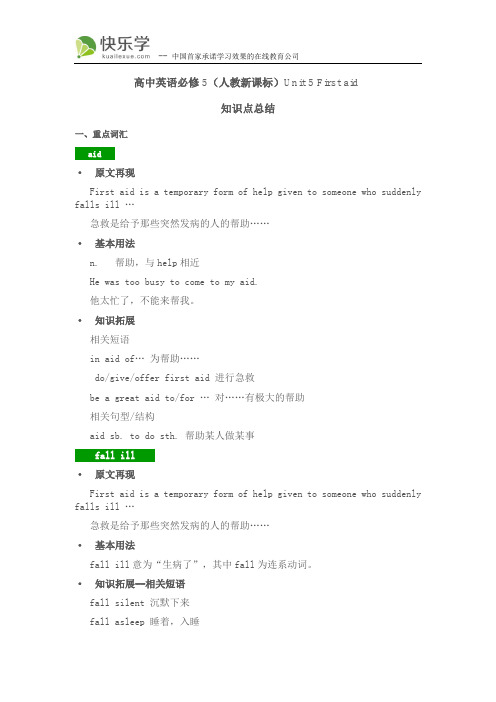
高中英语必修5(人教新课标)Unit 5 First aid知识点总结一、重点词汇aid·原文再现First aid is a temporary form of help given to someone who suddenly falls ill …急救是给予那些突然发病的人的帮助……·基本用法n. 帮助,与help相近He was too busy to come to my aid.他太忙了,不能来帮我。
·知识拓展相关短语in aid of… 为帮助……do/give/offer first aid 进行急救be a great aid to/for … 对……有极大的帮助相关句型/结构aid sb. to do sth. 帮助某人做某事fall ill·原文再现First aid is a temporary form of help given to someone who suddenly falls ill …急救是给予那些突然发病的人的帮助……·基本用法fall ill意为“生病了”,其中fall为连系动词。
·知识拓展--相关短语fall silent 沉默下来fall asleep 睡着,入睡fall down/over 跌倒,绊倒fall off 脱落,脱离injury·原文再现Often the illness or injury is not serious,…通常这种疾病或伤势并不严重……·基本用法n. 损伤;伤口,伤害(名词复数: injuries)·知识拓展其他词性injury v. 受伤,伤害词义辨析hurt/injure/wound/cutvariety·原文再现You can get burned by a variety of things:…你可能会因为各种原因被烫伤:……·基本用法n. 不同种类,多种式样;变化;多样化;多变性(名词复数:varieties)We all need variety in our diet.我们都需要饮食多样化。
新人教版高中英语必修5 Unit 5 First aid单元复习(学用考重点)

人教版高中英语必修5Unit 5 First aid单元复习知识点归纳:1.★考点aid n.& vt.帮助;援助;资助come to one’s aid 来帮助某人in aid of 用以援助,作为援助……之用aid sb.with sth.在某方面帮助某人with the aid of sb./sth.= with sb.’s/sth.’s aid 在某人/某物的帮助下give/do first aid进行急救aid sb.in doing sth.帮助某人做某事2.★考点in place在适当的位置;适当in place在适当的位置;适当in place of代替out of place在不适当的位置take place发生,举行take the place of=be in one’s place代替;替代3.★考点vital adj.极其重要的;必不可少的;生死攸关的4.be about to do sth.when...正准备做某事,就在这时……be on the point of doing sth.when...马上就要做某事,正在这时……had just done sth.when...刚完成了某事,就在这时……hardly...when...一……就……4.★考点一 a number of若干;许多表示“许多”的短语还有:修饰可数名词复数的有 a good/great many,quite a few,a large/great/small number of等。
修饰不可数名词的有a great deal of,quite a little,an amount of等。
既能修饰可数名词,又能修饰不可数名词的有a lot of,lots of,plenty of,a great quantity of,quantities of等。
5.★考点put one’s hands on 找到hand的相关短语:at hand在手边by hand用手工from hand to hand从一人手中传到另一人手中hand in hand手拉手;共同地in hand在手里;在控制之下on the one hand...on the other hand一方面……另一方面out of hand 无法控制6.★考点treat vt.& vi.治疗;对待;款待n.款待;招待辨析:treat,cure与healtreat多指治疗活动,强调动作过程。
人教版高二英语必修5Unit5FirstaidGrammar课件
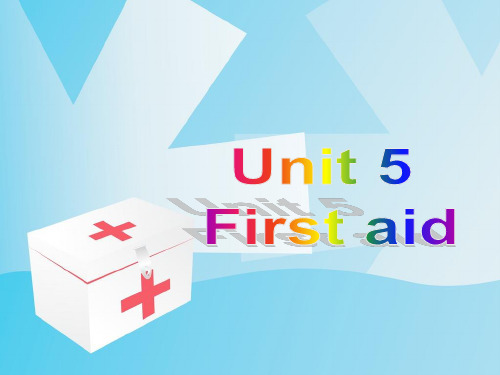
为了使语言简洁或避免重复, 省略句中的一个 或几个句子成分, 这种语法现象称为省略。
(1) (I) Beg your pardon. (2) (It) Sounds like a good
(1) (Are you) Hungry? (2) (I want) Orange juice,
please.
宾语
主语和谓语 (或主语和谓语的 一部分)
A: Would you like to come to the party?
B: I’d love to (come the party).
They do not visit their parents as much as they ought to (visit their parents).
Sentences from this unit:
1. These burns are serious and (these burns) take a few weeks to heal.
2. Often the illness or injury is not serious, but there are other times when (the illness or injury is serious and) giving first aid quickly can save lives.
定语从句中的省略 限制性定语从句中,可省略在从句中作 _宾__语___的关系代词that, which, whom, who。
4. a. When (he was) rescued, he was almost dead.
人教新课标版高中英语必修五Unit5Firstaid知识讲解
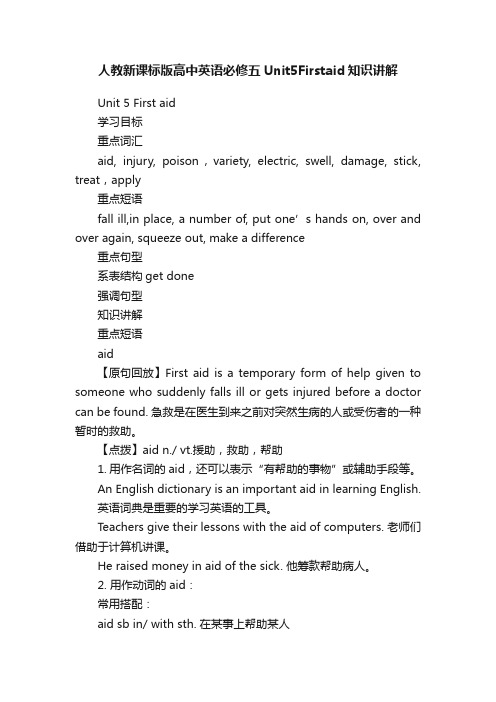
人教新课标版高中英语必修五Unit5Firstaid知识讲解Unit 5 First aid学习目标重点词汇aid, injury, poison,variety, electric, swell, damage, stick, treat,apply重点短语fall ill,in place, a number of, put one’s hands on, over and over again, squeeze out, make a difference重点句型系表结构get done强调句型知识讲解重点短语aid【原句回放】First aid is a temporary form of help given to someone who suddenly falls ill or gets injured before a doctor can be found. 急救是在医生到来之前对突然生病的人或受伤者的一种暂时的救助。
【点拨】aid n./ vt.援助,救助,帮助1. 用作名词的aid,还可以表示“有帮助的事物”或辅助手段等。
An English dictionary is an important aid in learning English.英语词典是重要的学习英语的工具。
Teachers give their lessons with the aid of computers. 老师们借助于计算机讲课。
He raised money in aid of the sick. 他筹款帮助病人。
2. 用作动词的aid:常用搭配:aid sb in/ with sth. 在某事上帮助某人aid sb. to do sth. 帮助某人做某事I aided the people who suffered from the big earthquake with money.我用钱来援助在地震中受灾的人们。
人教版高二英语必修五 Unit 5 First aid 重难点讲解

Unit 5First aid重难点讲解一、重点词汇、短语与句式重点词汇1.v.宣布announce announcement announcer n,广播员,告知者2.v..指导,命令Instruct instruction n. instructive adj.有益的,教育性的3.adj.热心的,热情的Enthusiastic enthusiasm n.狂热,热心enthusiast n.热心家,狂热者4.adj.有价值的valuable value n. 价值value v. 估价, 评价5.vi.& vt.捐助,捐献,贡献;投稿contribute6. n. 踝ankle, toe, heel sole of your feet7. n. 器官organ heart, liver, spleen, lung, kidney6. n. 症状;征兆symptom a symptom of + bad situation8. adj. 至关重要的vital;significant; crucial;9. adj. 勇敢的________ n. 勇气;勇敢brave bravery10. ________ adj. 温和的, 温柔的________ adv. 温和地, 适度地mild mildly 重点短语1.________________ 急救first aid give/offer aid 援助come to sb.'s aid 2.________________ 烧伤get burned3.________________ 触电;电休克electric shock4.________________ 榨出;挤出squeeze out squeeze time5.________________ 反复;多次again and again over and over again6.________________ 在适当的位置;适当in placeout of place 不在适当的位置,不适in place of 代替take the place of 代替7.________________ 找到put one’s hands on8.________________ 区别对待;有影响;起(重要)作用make a difference重点句式1.Remove clothing using scissors ____________________ it is stuck to the burn.除非衣服粘贴在烧伤面上,否则都要把衣服脱掉。
Unit 5 First aid 语法课件--高中英语人教新课标必修五
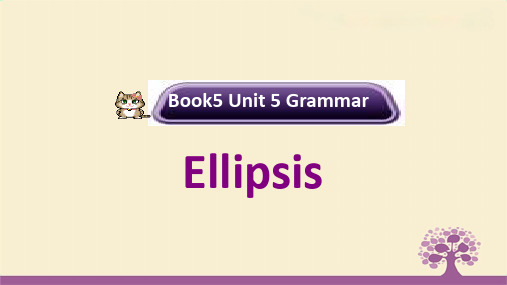
四、不定式的省略
• 1.有些动词后跟不定式作宾语时,可以将其动词省略而保 留to,这样的动词常见的有:want, wish, expect, hope, like, love, try,forget, prefer, mean等。
• ①---I am going climbing. Will you go with me. • ---I’d like to(go with you). • ②My parents encouraged me to go to college, but I didn’t
二、并列句中的省略
• 在由并列连词and, but, or等连接的并列句中,后面的分句 可以省略与前面分句中相同的成分,以免重复。
• 1) She was young but(she was)brave. • 2) Lin’s father was not at home, but his mother was (at home). • 3) I study at college and my sister (studies) at high school.
3) If虚拟条件句中有should/had/were时,if可以 省略,从句中的主谓要倒装
• Were they here now, they could help us.
• ( =If they were here now, they could help us.)
• Had I had time, I would have run round that lake again.(=If I had had time, I would have run round that lake again.)
7. Only some of the students have done a first aid course but most of the students haven’t done a first aid course .
人教版高中英语必修5课件unit5firstaidGrammar
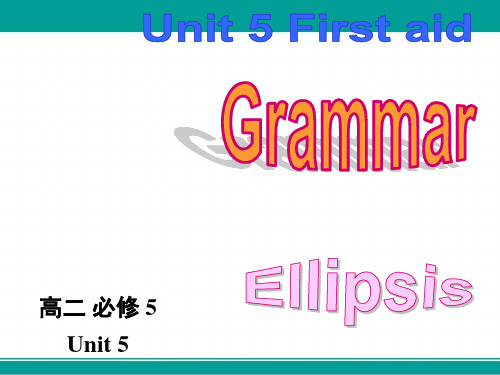
在并列复合句中,后面分句中与 前面分句中相同的部分常可省略
6) You can borrow my first aid notes if you want to.
To her teacher’s surprise, she did better in her first aid exam than (she was) expected (to do).
在 than, as 引导的比 较状语从句中的省略
4) I don’t think they have returned from the hospital, but they might have.
please.
的一部分)
A: Would you like to
come to the party? B: I’d love to (come the
party).
不定式后 省略动词
They do not visit their parents
as much as they ought to (visit
— Well, her parents wouldn’t allow
her to go to the party, but she
still _____.
A. hopes to
B. hopes so
C. hopes not
D. hopes for
5. We all know that, ______, the situation will get worse.
高中英语 Unit 5 First aid Grammar素材 新人教版必修5

Basic First AidAccidents happen anywhere and anytime. The first response to an accident is the most important. Often times, first aid given at the scene can improve the victim’s chances of survival and a good recovery. The right response is better than an incorrect quick one. Any response, even if it is wrong, is better than none at all.Unconscious VictimIf the victim is unconscious, perform rescue breathing. (Rescue breathing is explained later on in this section.) If the victim’s heart has stopped beat ing, perform resuscitation (CPR) if you have been properly trained to do so.ShockShock usually accompanies severe injury or emotional upset. The signs are cold and clammy skin, pale face, chills, confusion, frequent nausea or vomiting and shallow breathing. Until emergency help arrives, have the victim lie down with the legs elevated. Keep the victim covered to prevent chilling or loss of body heat. Give non-alcoholic fluids if the victim is able to swallow and has not sustained an abdominal injury.BleedingUntil emergency help arrives, try to control bleeding. If possible, first put on rubber or latex gloves before touching blood. If these are not available, a clean plastic bag can be used to cover your hands. It is important not to come in contact with blood because of the health risks.If finger or hand pressure is inadequate to control bleeding, place a thick pad of clean cloth or bandage directly over the wound, and hold in place with a belt, bandage, neckties or cloth strips. Take care not to stop the circulation to the rest of the limb. For injuries where a tie cannot be used, such as to the groin, back, chest, head and neck, place a thick pad of clean cloth or bandage directly over the wound and control the bleeding with finger or hand pressure. If bones are not broken, raise the bleeding part higher than the rest of the body. If the injury is extensive, the victim may go into shock and should be treated for it.As a last resort, a tourniquet can be applied to stop bleeding. There is a risk of sacrificing a limb to save a life. A tourniquet is a wide band of cloth or other material tightly placed just above the wound to stop all flow of blood. A tourniquet crushes the tissue and can cause permanent damage to nerves and blood vessels. Once in place, a tourniquet must be left there until a physician removes it. The victim must be taken to medical help as soon as possible.Burns and ScaldsUntil medical help arrives, immerse the burned area immediately in tap or cool water or apply clean, cool, moist towels. Do not use ice because it may cause further damage to the burned area. Maintain this treatment until the pain or burning stops. Avoid breaking any blisters that may appear. Do not use ointments, greases or powders.For more severe burns or chemical burns, keep the victim quiet and treat them for shock. Remove any clothing. If the clothing sticks to the burned area, leave it there. For exposure to chemicals, flush the skin with plenty of water, but only cover the exposed area with a clean bandage if the chemical has caused a burn. If the burn victim is conscious, can swallow and does not have severe mouth burns, give plenty of water or other non-alcoholic liquids to drink. Get the victim to a physician or hospital as soon as possible.Broken BonesFor fractured limbs, take the following precautions until emergency help arrives. Place the injured part in as natural a position as possible without causing discomfort to the patient. If the patient must be moved to a medical facility, protect the injured part from further injury by applying splints long enough to extend well beyond the joints above and below the fracture. Use firm material, such as a board, pole or metal rod, as a splint. Pad the splints with clothing or other soft material to prevent skin injury. Fasten splints with a bandage or cloth at the break and at points along the splint above and below the break. Use a pressure bandage to control any bleeding.For very serious fractures involving injuries to the body, neck or back, observe the following: Do not move the victim without medical supervision, unless absolutely necessary, and then only if the proper splints have been applied. If a victim with a suspected neck or back injury must be moved, keep the back, head and neck in a straight line, preventing them from being twisted or bent during movement. Use a board or stretcher to support the victim, if available.Spinal InjuriesTake special care when helping a spinal injury victim. All damage to the spinal cord is permanent, because nerve tissue cannot heal itself. The result of nerve damage is paralysis or death.Do not move the limbs or body of a victim with a suspected spinal injury unless the accident scene is such that there is imminent danger of further injury or unless it is necessary to est ablish breathing. The victim’s body should be stabilized toprevent any movement of the head, neck or body. Be aware that any movement of a victim with spinal injury may result in paralysis or death.If the victim must be moved, keep the neck and torso of the body as straight as possible and pull in a direction that keeps the victim’s spine in a straight line. Pull the body from the feet or shoulders (using both feet, both shoulders, or both arms pulled over the shoulders). It is also possible to pull the victim by the clothing. Grab the victim by the collar of the shirt and support the victim’s head with your forearms while pulling. The clothing drag is preferred because the victim’s head is supported while being moved. Do not pull the body sideways.When providing patient care, it may be necessary to roll the victim over on his or her back to clear an airway or evaluate breathing. When rolling the victim over, the head, neck and torso should be moved together so that no twisting occurs.Rescue Breathing for an AdultWhen breathing movements stop, or lips, tongue and fingernails become blue, a person needs immediate help. When in doubt, apply rescue breathing until medical help arrives. Delay if rescue breathing my cost the victim’s life. Start immediately. Seconds can count.The American Red Cross teaches the following 10 steps to assist an adult who has stopped breathing.Does the person respond? Tap or gently shake the victim. Shout, "Are you OK?"Shout, "Help!" Call people who can phone for help.Roll the person onto their back by pulling them slowly toward you. Slowly pull towards you until the victim is face up.Open the airway by tilting the head back, and lift the chin. Clear the mouth and throat of any obstructions with your fingers.Check for breathing. Look, listen and feel for breathing for three to five seconds.Give two full breaths. Keep the head tilted back. Pinch the nose shut and seal your lips tight around the victim’s mouth. Give two full breaths for one to one and a half seconds each.Check for pulse at the side of the neck. Feel for pulse for five to 10 seconds.Phone emergency staff for help. Send someone to call for an ambulance.Continue rescue breathing. Keep the head tilted back, lift the chin and pinch the nose shut. Give one full breath every five seconds. Look, listen and feel for breathing between breaths.Recheck the pulse every minute. Keep the head tilted back and feel for the pulse for five to 10 seconds. If the victim has a pulse, but is not breathing, continue rescue breathing.For infants and small children, follow the first five steps listed above. On the sixth step cover the child’s mouth and nose in a tight seal and give two small breaths. Check for pulse and call for help. Begin rescue breathing, give one small breath every three seconds for an infant and one every four seconds for a child.ChokingChoking occurs when food or a foreign object obstructs the throat and interferes with normal breathing. The following steps are advised if the choking victim is unable to speak or cough forcefully.For adults and children over one year of age:Ask, "Are you choking?"Shout, "Help!" Call for help if the victim cannot cough, speak or breath, is coughing weakly or is making high-pitched noises.Phone emergency staff for help. Send someone to call an ambulance.Do abdominal thrusts. Wrap your arms around the victim’s waist. Make a fist. Place the thumbside of the fist on the middle of the victim’s abdomen just above the navel and well below the lower tip of the breastbone. Grasp the fist with the other hand. Press the fist into abdomen with a quick upward thrust.Repeat abdominal thrusts until the object is coughed up or the victim starts to breathe or cough. If the victim becomes unconscious, lower the victim onto the floor. Do a finger sweep. Grasp the tongue and lower jaw and lift jaw. Slide the finger down inside of the cheek to base of tongue. Sweep the object out.Open the airway. Tilt the head back and lift the chin.Give two full breaths. Keep the head tilted back, pinch the nose shut, and seal your lips tight around the victim’s mouth. Give two full breaths for one to one and a half seconds.Give six to 10 abdominal thrusts. If the air will not go in, place the heel of one hand against the middle of the victim’s abdomen. Place the other hand on top of the first hand. Press into the abdomen with quick upward thrusts.Repeat step six through nine until the airway is cleared or the ambulance arrives.For infants less than one year old:Place the victim’s head in a downward position on the rescuer’s forearm with the head and neck stabilized.With the heel of the rescuer’s hand, administer five rapid back blows between the victim’s shoulder blades.If the obstruction remains, turn the victim face up and rest on a firm surface.Deliver five rapid thrusts over the breastbone using two fingers.If the victim is still not breathing normally, administer mouth-to-mouth resuscitation as specified for an infant.Repeat the above steps as necessary. If the obstruction cannot be removed, call for medical help immediately.。
人教版英语第一部分 必修5 Unit 5 First aid
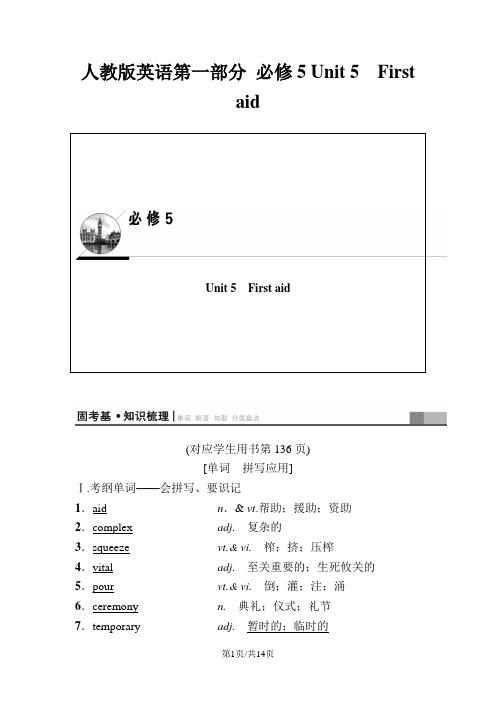
人教版英语第一部分必修5 Unit 5FirstaidUnit 5First aid(对应学生用书第136页)[单词拼写应用]Ⅰ.考纲单词——会拼写、要识记1.aid n.& vt.帮助;援助;资助2.complex adj. 复杂的3.squeeze vt.& vi. 榨;挤;压榨4.vital adj. 至关重要的;生死攸关的5.pour vt.& vi. 倒;灌;注;涌6.ceremony n. 典礼;仪式;礼节7.temporary adj. 暂时的;临时的8.bleed vt.& vi. 流血9.choke vi.& vt. (使)噎住;(使)窒息10.barrier n. 屏障;障碍(物)11.symptom n. 症状;征兆12.damp adj. 潮湿的13.pressure n. 压力14.ambulance n. 救护车Ⅱ.派生单词——能辨别1.injure vt.受伤→injury n.损伤;伤害2.poison n.毒药;毒害vt.毒害;使中毒→poisonous adj.有毒的3.vary v.变化→various adj.各种各样的→variety n.变化;多样(化);多变(性)4.mild adj.轻微的;温和的;温柔的→mildly adv.轻微地;温和地5.swell vt.& vi.(使)膨胀;隆起→swollen adj.肿胀的6.bear vt.忍受;承受→bearable adj.可忍受的→unbearable adj.难以忍受的;不能容忍的7.tight adj.牢的;紧的;紧密的→tightly adv.紧地;牢牢地8.firm adj.(动作)稳定有力的;坚定的→firmly adv.坚固地;稳定地9.brave adj.勇敢的→bravery n.勇敢;勇气→bravely adv.勇敢地10.treat vt.&vi.治疗;对待;款待n.款待;招待→treatment n.治疗;疗法;对待11.apply vt.& vi.应用;申请→applicant n.申请人→application n.申请Ⅲ.语境应用(用所给词的适当形式填空)1.The people in the flooded area fought bravely against the natural disaster.Their bravery deserved to be praised.(brave)2.We like to live a life full of variety and men's tastes are various.(vary) 3.People had to treat themselves in their own way before they received the treatment sent by the government.(treat)4.Tom got badly injured in the car accident.The injury to his leg wasreally serious.(injure)[拓展联想][短语多维应用]Ⅰ.短语回顾——会默写1.over_and_over_again反复;多次2.a_number_of 若干;许多3.carry_out 进行;开展4.fall_ill 生病5.squeeze_out 榨出;挤出6.in_place 在适当的位置;适当7.put_one's_hands_on 找到8.make_a_difference 区别对待;有影响;起(重要)作用9.take_off 脱下;起飞10.prevent...from 阻止……Ⅱ.语境应用(选用上述短语的适当形式填空)1.Arriving in London,she suddenly fell_ill because she couldn't bear the changeable weather.2.The professor always urges us that everything should be put in_placebefore we leave the lab.3.I'm sure that our hard work can make_a_difference and everything will be OK.4.I've told you over_and_over_again not to do that but you won't listen. 5.My writing career took_off when I discovered my own style. 6.Hannah was busy with work then but she still tried her best to squeeze_out some time from her tight schedule to visit her mother.[拓展联想][句式结构仿写]is stuck to the burn. Unless_one_is_fully_prepared,outdoorsports can sometimes mean injuries.【导学号:65670107】2.be doing...when...正在做……这时……John was studying in his roomwhen he heard screaming.2.昨天下午,我和李明放学回家,这时我们看见一位老太太被一辆车撞倒了。
人教版必修五第10讲:Unit5 First aid-语法篇(学生版)

Unit5 First aid-语法篇__________________________________________________________________________________ __________________________________________________________________________________1.学会if引导的省略句的用法;2.能够使用if引导的省略句的知识点作对相关题目,灵活使用。
省略句状语从句中的省略用法一、如果从句的主语和主句的主语一致,且从句的谓语含有be动词的某种形式(am/is/are/was/were)可同时省略从句的主语和be动词的某种形式。
1. when,while引导的时间状语从句e.g. 当你过马路的时候一定要小心。
Do be careful when (you are) crossing the street.在我去工作的路上,我遇见了她。
When/While (I was) on my way to work,I met her.2. if ,unless,once引导的条件状语从句e.g. If (it is) properly treated,waste will do no harm to the environment.我不会去晚会的,除非我被邀请。
I’ll not go to the party unless (I am) invited.一旦你在超市里被抓到偷东西,你会受到惩罚的。
Once (you are) caught stealing in a supermarket,you will be punished.3. though,although,whether,no matter whether/what/how/who等引导的让步状语从句e.g. 他很开心,尽管他很贫穷。
He was happy,though/although (he was) poor.他虽然年轻但懂得很多。
人教版新课标高中英语教学(必修5)新人教版必修五unit5firstaid[知识点剖析].doc
![人教版新课标高中英语教学(必修5)新人教版必修五unit5firstaid[知识点剖析].doc](https://img.taocdn.com/s3/m/fba9411b8bd63186bdebbc4e.png)
Unit 5 First aid (知识点剖析)单词•巧记•典句•考点aid [eid] n・& vi・帮助;援助;资助【巧记提示】aid (资助)Taim(FI的)[经典例句】She came to my aid.她来帮助我。
【考点聚焦】辨析aid与help:相同点:aid与help作动词时,都有“帮助"之意,有吋可通用。
不同点:aid是比较正式的用法,较为庄重,在口常生活屮并不多用; help则含义较广,特别在日常生活中用的较多,几乎所有用aid的地方都可以用help代替,但在表示“救护”时,用aid不用help。
injury [ \n y d 3 ^ri] n •损伤;伤害【巧记提示】in (在……里)+jur(法律;法学;法理)+ y (品质;性质;状态)【经典例句】In the crash he suffered severe injuries to the head and arms.在事故中他头部和双臂受了重伤。
【考点聚焦】"injure也可表示“损害名誉;伤害感情等”。
2)同根词injured adj.受伤的,受委屈的3)辨析injure, hurt 与wound: injure 一般指由于意外或事故而受伤;hurt多用丁•精神上的伤害。
hurt是受伤的一般用语,也可指精神上的伤害;wound指外伤,如枪伤、刀伤、剑伤,尤指在战争中、战斗中受伤;hurt也可用作不及物动词,意为“疼痛,惹起痛苦二blee叫bli: d] v. 出血,流血[巧记提示】bleed(流血)->blood(血)【经典例句】His nose was bleeding.他在流鼻血。
【考点聚焦】1)bleed常引申为为国家、正义等流血、牺牲覽2)固定搭配:bleed for为.... 而流血,悲痛bleed sb.white榨干血汗,榨完钱财bleed to death出血过多而导致死亡burn [b3: n] v.(被)烧毁;(被)烧伤;(被)烫伤n.烧伤或灼伤(的痕迹)【经典例句】v. She burnt all his letters to her*. 她把所有他寄给她的信都烧了。
人教版必修五第10讲:Unit5 First aid-语法篇(学生版)
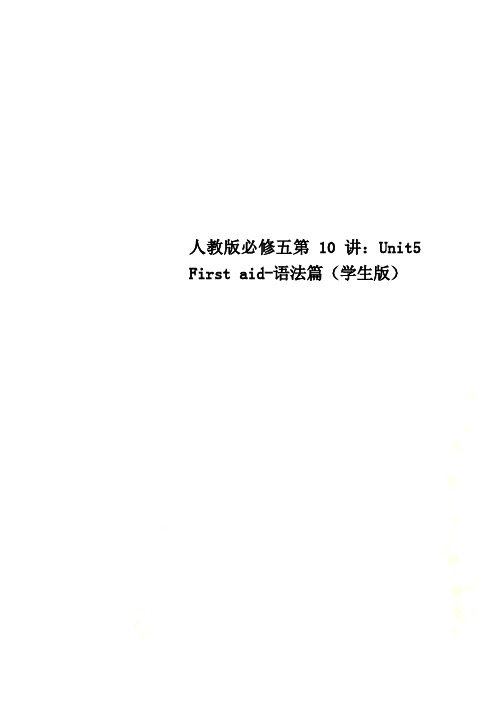
人教版必修五第10讲:Unit5 First aid-语法篇(学生版)谓语的省略--what do you think made Mary so upset?--Losing her new bicycle (made Mary so upset).状语从句的省略Seen from the plane(when it is seenfrom the plane), thehouse looks like tinytoys.If (it is) possible, I’llgo there with you.注意状语从句中的主语同主句主语的一致性。
不定式的省略The boy wanted toride his bicycle inthe street, but hismother told him notto. (not to ride hisbicycle in thestreet.)--Alice, why didn’tyou come若不定式后面是完成时,省略时应保留have;不定式后含有动词be的结构时,也要保留be动词。
--Did you tellhim the news?yesterday?--I was going to (come yesterday), but I had an unexpected visitor. --I ought to have (told him the news), but I didn’t know how to speak. --Are you an engineer?--No, but I want to be.状语从句中的省略用法一、如果从句的主语和主句的主语一致,且从句的谓语含有be动词的某种形式(am/is/are/was/were)可同时省略从句的主语和be动词的某种形式。
1. when, while引导的时间状语从句e.g. 当你过马路的时候一定要小心。
人教版高中英语语法学案必修5Unit5 First aid

Ⅰ.单词拼写根据音标及词义写出英文单词。
1.ankle['æŋkl] n.踝(关节) 2.skin[skIn] n. 皮;皮肤3.organ['ɔːɡən] n. 器官4.barrier['bærIə] n. 屏障;障碍(物) 5.liquid['lIkwId] n. 液体6.symptom['sImptəm] n. 症状;征兆7.scissors['sIzəz] n.(pl.) 剪刀8.radiation[ˌreIdI'eIʃn] n. 辐射;射线9.pressure['preʃə] n. 压力;压迫(感) 10.pour[pɔː(r)] v t.& v i. 倒;灌;注;涌11.swell[swel] v t.& v i. (使)膨胀;隆起12.apply[ə'plaI] v t.& v i. 涂;运用;申请13.vital['vaItl] adj. 至关重要的14.complex['kɒmpleks] adj. 复杂的15.treat[triːt] v t.& v i. 治疗;对待n. 款待16.bandage['bændIdʒ]n. 绷带Ⅱ.单词拓展写出下列单词及其派生词。
1.injure v.损伤;伤害injured adj. 受伤的injury n. 损伤;伤害2.blood n. 血bleed v t.& v i. 流血3.brave adj. 勇敢的bravery n. 勇气;勇敢4.mild adj. 温和的;温柔的mildly ad v. 温和地;适度地5.treat v t.& v i. 款待;对待;治疗treatment n. 待遇;对待;处理;治疗6.press v. 压;压迫pressure n. 挤压;压力;压迫(感)1.first_aid(对伤患者的)急救2.fall_ill 生病3.prevent...from... 阻止……4.get_burned 烧伤5.electric_shock 触电;电休克6.squeeze_out 榨出;挤出7.over_and_over_again 反复;多次8.in_place 在适当的位置;适当9.a_number_of 若干;许多10.put_one’s_hands_on 找到11.make_a_difference 区别对待;有影响;起(重要)作用1.as 引导非限制性定语从句So as you can imagine,if your skin gets burned it can be very serious.[仿写]正如已经指出的,这本书对每个人都有益。
人教版必修五Unit5FirstAidgrammar课件(48张)
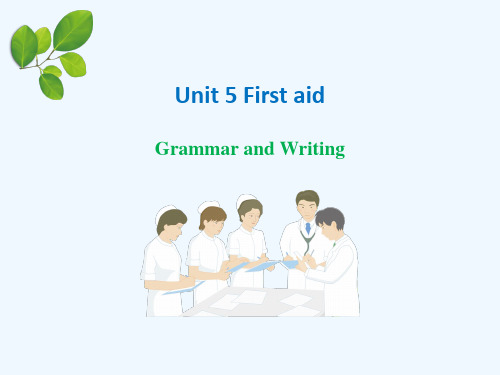
二、省略的用法 1.并列句中的省略 一般说来,在后一并列句中凡是与上文相同的成分 通常都可省略。如: My room is on the fifth floor,and hers (is) on the eighth (floor).我的房间在五楼,而她的在八楼。
I came at eight but Henry (came) at nine. 我八点来的,但亨利是在九点来的。
I didn‘t know who made him cry. 我不知道谁把他惹哭了。 (4)在某些句式中,如介词but前有动词do的任何形式, 后面的不定式要省略to。如:
I can do nothing but wait. 我能做的只有等待。
5.介词的省略 (1)在英语中一些与动词、名词、形容词搭配的介词 常被省略,而只保留后面的动名词。如: spend time/money (in)doing sth;have difficulty/trouble (in)doing sth;prevent/stop sb (from)doing sth。
When (the novel is) published,the novel will become
one of the bestsellers of the year. 那本小说出版的时候就会成为当年的畅销书之一。 Although (he was) hardworking,he couldn't earn
enough to support himself. 尽管努力工作,他的收入还是不够自己糊口。
(3)宾语从句 引导宾语从句的that一般情况下可以省略;that后面 的宾语从句较长或在其他一些特殊的情况下,that不 能省略。如:
I hope (that) you'll be fine soon. 我希望你尽快康复。 Now scientists warn that if not under control,the unseen energy waves,“electric smog”,may be
人教版高中英语必修五 Unit5 First aid-语法篇(学生版)-最新教育文档

Unit5 First aid-语法篇____________________________________________________________________________________________________________________________________________________________________1.学会if引导的省略句的用法;2.能够使用if引导的省略句的知识点作对相关题目,灵活使用。
省略句状语从句中的省略用法一、如果从句的主语和主句的主语一致,且从句的谓语含有be动词的某种形式(am/is/are/was/were)可同时省略从句的主语和be动词的某种形式。
1. when, while引导的时间状语从句e.g. 当你过马路的时候一定要小心。
Do be careful when (you are) crossing the street.在我去工作的路上,我遇见了她。
When/While (I was) on my way to work, I met her.2. if , unless,once引导的条件状语从句e.g. If (it is) properly treated, waste will do no harm to the environment.我不会去晚会的,除非我被邀请。
I’ll not go to the party unless (I am) invited.一旦你在超市里被抓到偷东西,你会受到惩罚的。
Once (you are) caught stealing in a supermarket, you will be punished.3. though, although, whether, no matter whether/what/how/who等引导的让步状语从句e.g. 他很开心,尽管他很贫穷。
金老师教育培训人教版高中英语必修5 专题5.3 Unit 5 First aid Grammar
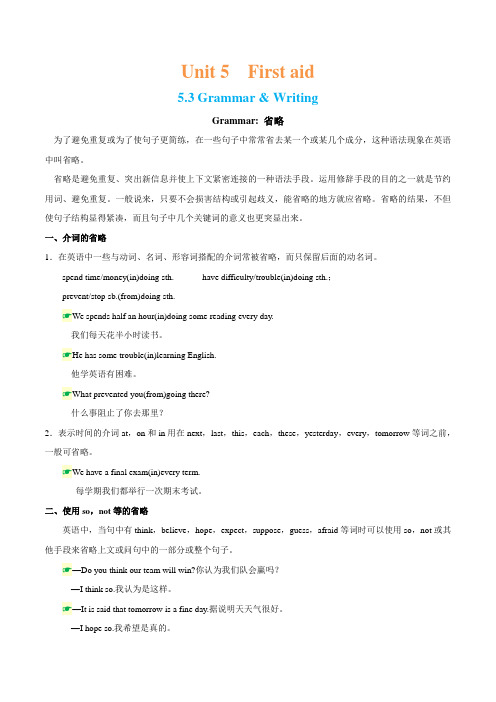
Unit 5 First aid5.3 Grammar & WritingGrammar: 省略为了避免重复或为了使句子更简练,在一些句子中常常省去某一个或某几个成分,这种语法现象在英语中叫省略。
省略是避免重复、突出新信息并使上下文紧密连接的一种语法手段。
运用修辞手段的目的之一就是节约用词、避免重复。
一般说来,只要不会损害结构或引起歧义,能省略的地方就应省略。
省略的结果,不但使句子结构显得紧凑,而且句子中几个关键词的意义也更突显出来。
一、介词的省略1.在英语中一些与动词、名词、形容词搭配的介词常被省略,而只保留后面的动名词。
spend time/money(in)doing sth. have difficulty/trouble(in)doing sth.;prevent/stop sb.(from)doing sth.☛We spends half an hour(in)doing some reading every day.我们每天花半小时读书。
☛He has some trouble(in)learning English.他学英语有困难。
☛What prevented you(from)going there?什么事阻止了你去那里?2.表示时间的介词at,on和in用在next,last,this,each,these,yesterday,every,tomorrow等词之前,一般可省略。
☛We have a final exam(in)every term.每学期我们都举行一次期末考试。
二、使用so,not等的省略英语中,当句中有think,believe,hope,expect,suppose,guess,afraid等词时可以使用so,not或其他手段来省略上文或问句中的一部分或整个句子。
☛—Do you think our team will win?你认为我们队会赢吗?—I think so.我认为是这样。
--学年人教版必修五unit 5 first aid grammar课件ppt(29张)
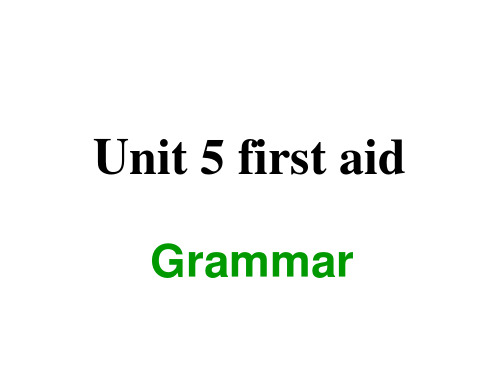
leaving I couldn't find her anywhere. A. to do B. to C. doing D. doing to
简单句中的省略
4.省略表语
(1) ---Are you thirsty? ---Yes, I am (thirsty). (2) His brother is lazy? Nor is his sister (lazy).
I saw the boy fall from the tree.
The boy was seen to fall from the tree.
The bossere made to work 12 hours a day.
其他省略
Unit 5 first aid
Grammar
Ellipsis
省略句
为了使语言简洁或避免 重复,省略句中的一个或 几个成分,这种语法现象 称为省略.
简单句中的省略
1.省略主语:祈使句中的主语通常被省略;其他 省略的主语的情况多限于少数现成的说法.
(1) (You) Come in, please. (2) (I) See you tomorrow. (3) (I) Thank you for your help. (4) (I) Beg your pardon.
其他省略
1.连词的that省略
(1)宾语从句中常省略that,但多个宾语从句并列时, 通常只省略第一个that He said (that) the text was very important and that we should learn it by heart.
- 1、下载文档前请自行甄别文档内容的完整性,平台不提供额外的编辑、内容补充、找答案等附加服务。
- 2、"仅部分预览"的文档,不可在线预览部分如存在完整性等问题,可反馈申请退款(可完整预览的文档不适用该条件!)。
- 3、如文档侵犯您的权益,请联系客服反馈,我们会尽快为您处理(人工客服工作时间:9:00-18:30)。
Unit5 First aid-语法篇____________________________________________________________________________________________________________________________________________________________________1.学会if引导的省略句的用法;2.能够使用if引导的省略句的知识点作对相关题目,灵活使用。
省略句状语从句中的省略用法一、如果从句的主语和主句的主语一致,且从句的谓语含有be动词的某种形式(am/is/are/was/were)可同时省略从句的主语和be动词的某种形式。
1. when,while引导的时间状语从句e.g. 当你过马路的时候一定要小心。
Do be careful when (you are) crossing the street.在我去工作的路上,我遇见了她。
When/While (I was) on my way to work,I met her.2. if ,unless,once引导的条件状语从句e.g. If (it is) properly treated,waste will do no harm to the environment.我不会去晚会的,除非我被邀请。
I’ll not go to the party unless (I am) invited.一旦你在超市里被抓到偷东西,你会受到惩罚的。
Once (you are) caught stealing in a supermarket,you will be punished.3. though,although,whether,no matter whether/what/how/who等引导的让步状语从句e.g. 他很开心,尽管他很贫穷。
He was happy,though/although (he was) poor.他虽然年轻但懂得很多。
Though (he is) young,he knows a lot.No matter how/However hard the task (is),we must fulfill it in time.(注:从句的主语和主句的主语不一致时,只省略从句中的be动词形式)4. as if,as though引导的方式状语从句e.g. She lay there,as if (she was) dead. (省略的主语和主句的主语一致)He opened his lips as if (he were going) to say something. 他张开嘴唇,好像要说什么话似的。
He stood up as if/though (he wanted) to leave.(as if/though + to do表示一个将来的动作)二、than,as引导的比较状语从句中的省略用法:当不同的主语进行比较时,一般省略从句中的谓语;当从句中的主语与谓语(be动词除外)和主句中的主语与谓语相同时,通常省略从句中的主语和谓语,只保留比较部分。
e.g. He is taller than his brother (is).I have as much as confidence in you as (I have confidence) in him.三、以if从句为代表的状语从句中的特殊省略用法:通常省略了it is,that is,there is/are。
E.g.如果有必要的话,这个老庙会被重新修建。
If (it is) possible/necessary,this old temple will be rebuilt.If (that is) so,I will call you back at 5:00 pm.There are only a few books in our school library,if (there are) any.四、定语从句中的省略用法关系词的省略关系代词that,which,whom等在限制性定语从句中充当宾语且不位于介词之后时,可以省略;in which 或that在先行词way后作方式状语从句时可省略。
e.g. 你昨天拜访的那个人是我的祖父。
The man (that/who/whom) you visited last night is my grandpa.我不喜欢你对待这个女孩的方式。
I don’t like the way (in which/that) you treat the girl.五、虚拟语气中if及should的省略1. 当条件状语从句中有were,had,should等时省略if,把它们提至句首,形成倒装句。
e.g. If I were a teacher,I would be strict with my students.= Were I a teacher,I would be strict with my students.2. Suggest,insist,order,require等表示建议、要求、命令的动词后接的名词性从句中,谓语动词常用“should+动词原形”,should可以省略。
e.g. 医生建议他尽力去减肥。
The doctor suggested that he (should) try to lose weight.六、So和not的替代性省略用于避免重复前面所说过的内容,替代词so/not替代肯定或否定的名词性从句。
可与believe,do,expect,fear,guess,hope,say,speak,suppose,think,I’m afraid等连用e.g. – Do you suppose he is going to attend the meeting? – I suppose not.— Can you finish your work today?— 我认为能。
I think so .— 我认为不能。
I don't think so . / I think not .七、日常交际中的省略在情景会话中,答语常常省略不会引起歧义的主语、谓语或宾语部分,而只保留对方希望了解的内容。
在复合句或并列句中,也有省略主、谓、宾的情况。
e.g. – How many copies do you want? -- (I want) Three copies,please.-- Have you ever been to the Great Wall? -- No,(I have) never (been to the Great Wall).注意:1.感官动词see,hear,feel,watch等和使役动词have,make,let等后接不定式作宾语时,不定式省略to。
2.do nothing but,can’t help but等结构常接省略to的不定式。
e.g. 我们昨天只是仅仅呆在家里看电视了。
We didn’t do anything but stay at home watching TV yesterday.听到这个消息,她禁不住哭了。
Hearing the news,she couldn’t help but cry.3.在特定语境中为了避免重复,当不定式再次出现时,在want,wish,hope,try,plan,like,love,hate后往往只保留to,而省略后面的动词。
但不定式后有be,have时,也保留be和have。
e.g. My parents encouraged me to go to college,(但是我不想去)but I didn’t want to.1. (2019·哈尔滨师范大学附属中学月考)All of the clothes in the shop are sold at half price,________otherwise noted.A. asB. ifC. untilD. unless2. (2019·陕西咸阳高考模拟考试二)Just now the patient opened her mouth as if ________something to her husband.A. saidB. sayC. to sayD. to have said3. (2019·哈师大附中、东北师大附中、辽宁实验中学一联)—Hi,are you an engineer in Lenovo Group?—No,but I________.A. want toB. want to beC. want soD. want it4. (2019·济宁模拟)As is often the case,little Tom,if________,is most likely to stop crying soon.A. left ignoringB. left ignoredC. leaving ignoringD. leaving ignored5. (2019·佳木斯一中高三第四次调研)He is ready to help others,seldom,________refusing them when they turn to him.A. if neverB. if everC. if notD. if any基础演练一、单项填空1. —What’s the matter with Della?—Well,her parents wouldn’t allow her to go to the party,but she still ________.A. hopes toB. hopes soC. hopes notD. hopes for2. Some of you may have finished Unit one.________,you can go on to Unit two.A. If you mayB. If you doC. If notD. If so3. —Have you got any particular plans for the coming holiday?—Yes.________,I’m going to visit some homes for the old in the city.A. If everB. If busyC. If anythingD. If possible4. The house I grew up ________ has been taken down and replaced by an office building.A. in itB. inC. in thatD. in which5. —Will the Smiths leave for Australia this spring?—No,they finally decided ________.A. not to leaveB. not leavingC. not toD. not to be leaving6. He decided not to say anything at the meeting unless ________.A. asking toB. to ask toC. asked toD. ask to7. —Have you watered the flowers?—No,but ________.A. I amB. I’m goingC. I’m just going toD. I will go8. ________ he come tomorrow,I would let you know.A. WouldB. ShouldC. ShallD. If9. —Did you have a good time in Thailand last week?—________.It was too hot.A. Not reallyB. Yeah,why notC. Oh,greatD. You’re right10. —I listen to English every day over the radio.—________interesting.A. SoundsB. SoundingC. It is soundedD. Sound11. —Do you think we will have a long holiday next month?—________.A. I believe notB. I believe not soC. I don’t believe itD. I don’t believe12. One of the sides of the board should be painted yellow,and ________.A. the other is whiteB. another whiteC. the other whiteD. another is white13. If the food tastes nice,we’ll buy some;if ________,________.A. no;noB. not;notC. not;noD. no;not14. —Who should be responsible for the accident?—The boss,not the workers. They just carried out the order ________.A. as toldB. as are toldC. as tellingD. as they told15. —My mother is preparing my favorite dishes. Go with me and have a taste,okay?—________.And I’ll be glad to meet your parents.A. I think soB. I’d love toC. I’m sureD. I hope so巩固提高一、句型转换(使用省略来改写句子)1. She works hard. It is no wonder that she passed the exam.She works hard.______ ______ ________ ________ ________ ________.2. They haven’t completed the project,but they ought to have completed it.They haven’t completed the project,______ ________ ________ ________ ________.3. It is well done.________ ________.4. Errors,if there are any,should be corrected.Errors,________ ________,should be corrected.5. If we had gone to the party,we would have known the fact.________ ________ ________ ________ ________ ________,we would have known the fact.二、用省略结构翻译句子1. 她想学好英语,但不知道怎么学。
